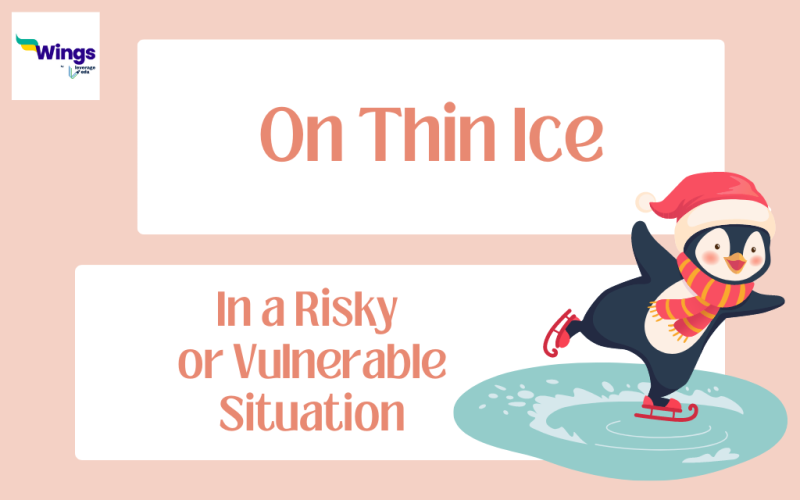The meaning of the idiom ‘On thin ice’ is a severe scenario of utmost risk. This means, when a speech or sentence includes the phrase, it is probably highlighting the vulnerability of the circumstance.
The origin of on thin ice idiomatic metaphor is traced back to the invention of skating in the Netherlands (then known as Holland). When skating on the thin ice of rivers, streams, or any waterbody in winter, was very common for people to risk their lives. Since then, the idiom became symbolic of all the scenarios that do not involve any safety major.
Also Read: Useful Idioms with Examples, Sentences and Meanings
Usage with Examples
When a person says that someone is walking on thin ice, he stresses the urgency of a precautionary major. Meaning, the situation at hand is quite careless or critical and needs immediate attention.
Take a glimpse at the examples given below to master the usage of the idiom in daily life:
- He knew he was on thin ice with his boss after missing multiple deadlines.
- The politician found himself on thin ice when his controversial statements were leaked to the media.
- After failing several classes, the student was on thin ice with his parents regarding his academic performance.
Also Read: Scrape the Barrel Meaning, Example, Synonyms
On Thin Ice Synonyms
The metaphorical phrase on thin ice is synonymous with the following idioms:
- Treading on dangerous ground
- Walking a tightrope
- Hanging by a thread
- Playing with fire
- Pushing one’s luck
On Thin Ice Meaning Quiz
The company’s finances were on thin ice, and:
- Any unexpected expenses could lead to bankruptcy.
- Any new investment could hike the company’s revenue.
- Required a delay in the new product’s launch.
Answer: Any unexpected expenses could lead to bankruptcy.
Also Read: Idioms for IELTS
This was all about the meaning and examples of the idiom ‘On thin ice’. Hopefully, you understood the concept where it’s used. For more such blogs, follow Leverage Edu.
 One app for all your study abroad needs
One app for all your study abroad needs















 60,000+ students trusted us with their dreams. Take the first step today!
60,000+ students trusted us with their dreams. Take the first step today!

